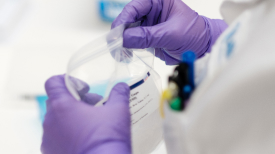- Cancer Care Team
Cancer Care Team
To deliver optimal patient outcomesProducts and Services
Cancer Type
Supplies & Tools
Scientific Focus
- Biopharma Partners
- Patients
- Education & Events
- Login
- Contact Us
Test Details
 Cancer Type
Cancer Type
Chronic lymphocytic leukemia (CLL), Hematologic malignancies, Leukemia, Lymphoma
 Technology Used
Technology Used
Molecular
 Turnaround Time
Turnaround Time
5 - 7 days
Use
This profile can be used to detect clonal B-cell immunoglobulin heavy chain (IGH) and immunoglobulin k light chain (IGK) gene rearrangements in blood, bone marrow and tissue specimens with combined B-cell clonality detection rate of 99%. The presence of a monoclonal gene rearrangement usually, but not always, reflects the presence of a B-lymphocytic neoplasm, while polyclonal gene rearrangement patterns are found in benign reactive condition. Thus, the results of these studies can assist in the diagnosis of lymphoproliferative disorders.
Special Instructions
Please direct any questions regarding this test to customer service at 800-345-4363.
Limitations
This PCR assay is able to detect a clonal DNA population at the sensitivity of 5% in a background of polyclonal DNA.
This test was developed and its performance characteristics determined by Labcorp. It has not been cleared or approved by the Food and Drug Administration.
Methodology
Polymerase chain reaction (PCR)
Specimen Requirements
Information on collection, storage, and volume
Specimen
Whole blood, bone marrow, formalin-fixed, paraffin-embedded (FFPE) tissue block or slides, fresh or frozen tissue
Volume
3 to 5 mL whole blood, 1 mL bone marrow, five unstained slides at 10 μM or formalin-fixed, paraffin-embedded tissue block, tissue in RPMI or frozen
Minimum Volume
0.5 mL whole blood, 0.5 mL bone marrow, two unstained slides at 10 μM
Container
Lavender-top (EDTA) tube, yellow-top (ACD) tube, green-top (heparin) tube, tan-top (K2-EDTA) tube and pink-top (K2-EDTA) tube, FFPE tissue block or slides, tissue in RPMI or frozen
Storage Instructions
Maintain blood, bone marrow or tissue in RPMI at 2°C to 8°C; FFPE specimens at room temperature; tissue at -80°C.
Causes for Rejection
Frozen whole blood/bone marrow; quantity not sufficient for analysis; tumor tissue; broken or stained slides
Collection
Fresh tissue should be placed in RPMI medium or shipped frozen on dry ice. Small samples (e.g., punch biopsies, fine-needle aspirates) will also be accepted. To avoid delays in turnaround time when requesting multiple tests on frozen samples, please submit separate specimens for each test requested.
Related Tests
Find more tests related to this one.





